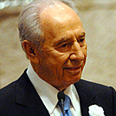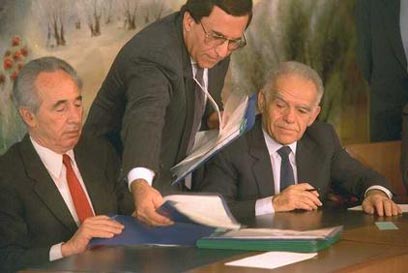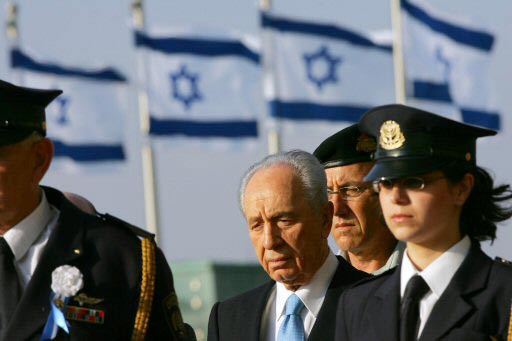
Shimon Peres is a senior Israeli statesman and a world renowned politician, whose political career spans some 65 years.
Born Szymon Persky in Wiszniew, Poland on August 2, 1923, he came to Israel in 1934, attended the Geula School in Tel Aviv and the Ben Shemen agricultural school, lived on Kibbutz Geva and was one of the founders of Kibbutz Alumot. He later attended the New York School for Social Research and Harvard University.
Peres first entered Israeli politics in 1959, and has been a constant figure in the local political arena ever since.
Prime minister of Israel three times, Peres served in 12 Israeli cabinets as finance minister, foreign minister, defense minister and development of the Negev, Galilee and regional economy minister, to name a few.

Keeping away from public eye. With Sonya (Photo: GPO)
Prior to his nomination for president he served as the vice premier of Israel, under Prime Minister Ehud Olmert. Peres was voted Israel's ninth president on June 13 2007.
In 1945, Peres married Sonya Gelman. The couple has three children, Tzvia, Yoni and Chemi, eight grandchildren and two great-grandchildren.
Political milestones
In 1947, he joined the Haganah, where David Ben-Gurion named him responsible for personnel and arms purchases; In 1948 he was named head of naval services in the Defense Ministry and in 1952 he was named deputy director general of the Defense Ministry.In 1953, at the age of 29, he became the youngest ever director -general of the Defense Ministry.
In 1959 Peres was elected to the Knesset for the first time. Running with Mapai (Mifleget Poalei Eretz Yisrael), he was made deputy defense minister.
In 1965 he left Mapai for David Ben-Gurion's new political party – Rafi (Reshimat Poalei Yisral). He was made the party's secretary-general and in 1967 was one of the driving forces behind the formation of the Mapai-Rafi union, which gave birth to Israel's Labor Party.

With Shamir during the 1988 unity government (Photo: GPO)
The 1970s saw Peres serve as minister of immigrant absorption, information minister and defense minister under Golda Meir. Following Meir's resignation, in the aftermath of the Yom Kippur War, Peres ran for prime minister for the first time. He lost to Yitzhak Rabin, sparking a bitter, decades-long political rivalry between the two.
Peres remained defense minister under Rabin until 1977. When the latter resigned, Peres was named acting prime minister. In 1977 he was also elected chairman of the Labor Party – a position he held until 1992.
Peres' attempts to lead Labor to an electoral victory failed both in 1977 and 1981. In 1984, when a Likud-Labor national unity government was formed, he shared the prime minister's position with then Likud leader Yitzhak Shamir: Peres served as prime minister for tow years while Shamir was the foreign minister, and after 24 months they traded places, making Shamir the prime minister and Peres foreign minister.
In the national unity government which followed in 1988, Peres was the vice premier and finance minister. After failing to carry a no-confidence vote against the Likud-led government in 1990, Peres resigned from government, leading Labor to the opposition.
Architect of peace
In 1992, after Labor – headed by Yitzhak Rabin – won the elections, Peres was named foreign minister.
Peres than began negotiating with Yasser Arafat and the PLO, trying to get the organization to recognize Israel. Those negotiations materialized into the Oslo Accords, which effectively created the Palestinian Authority.
The Oslo Accords were finalized on August 20, 1993 and signed by Mahmoud Abbas for the PLO and Peres for Israel.
In 1994, Peres – along with Rabin and Arafat – were awarded the Nobel Peace Prize for the peace talks that produced the Oslo Accords.

Receiving the Nobel Peace Prize. Peres, Rabin and Arafat (Photo: GPO)
After Yitzhak Rabin was assassinated, on November 4 1995, Peres was again named prime minister, defense minister and finance minister. In 1996 he ran for prime minister again, but lost to Likud leader Benjamin Netanyahu.
In 1997 he formed the Peres Center for Peace, aimed at implementing his vision of "a new Middle East".
In 1999, when Ehud Barak was voted prime minister, he named Peres minister for regional development.
At that time, Peres made a bid to become Labor President – a move Barak was able to rebuff.
The new millennia
Peres first ran for president in 2000, but lost to Moshe Katsav. In 2001 he was named foreign minister under Ariel Sharon, and in 2003 voted temporary chairman of Labor, following then party leader Amram Mitzna's resignation.
In January 2005, when Labor joined Sharon's government, he was named vice premier. In November of that year, Peres lost his bid for Labor leadership to Amir Peretz and several weeks later announced he was leaving the Labor party.
Peres shocked his political allies and rivals both, when in December 2005 he joined Ariel Sharon's new Kadima. When a mass stroke rendered Sharon debilitated, his successor, Ehud Olmert named Peres vice premier and development of the Negev, Galilee and regional economy minister.
In mid 2007, after a sex scandal forced then President Moshe Katsav to resign, Peres made his second bid for the presidency, this time running against Likud's Reuven Rivlin and Labor's Colette Avital.
The 2007 presidential election's first round left all three candidates in the running with Peres slightly in the lead. Faced with the tight race, both Rivlin and Avital withdrew from the race, lending their support to Peres.

Peres en route to swearing in ceremony (Photo: AFP)
On June 13 2007, the Knesset voted Shimon Peres Israel's ninth president. The vote was carried 86-23, with eight MKs abstaining, two null votes and one absentee. He was sworn in as president of the State of Israel on July 15 2007.
Shimon Peres published 11 books, including The Next Step (1965), David's Sling (1970), And Now Tomorrow (1978), From These Men: Seven founders of the State of Israel (1979), Entebbe Diary (1991), The New Middle East (1993), Battling for Peace: A memoir (1995), For the Future of Israel (1998) and The Imaginary Voyage : With Theodor Herzl in Israel (1999).
Sonya Peres, who refused to join her husband at the President's Residence and preferred to stay in their apartment in northern Tel Aviv, died in January 2011 at the age of 87.














